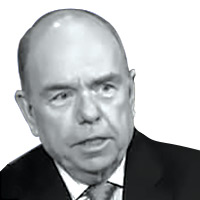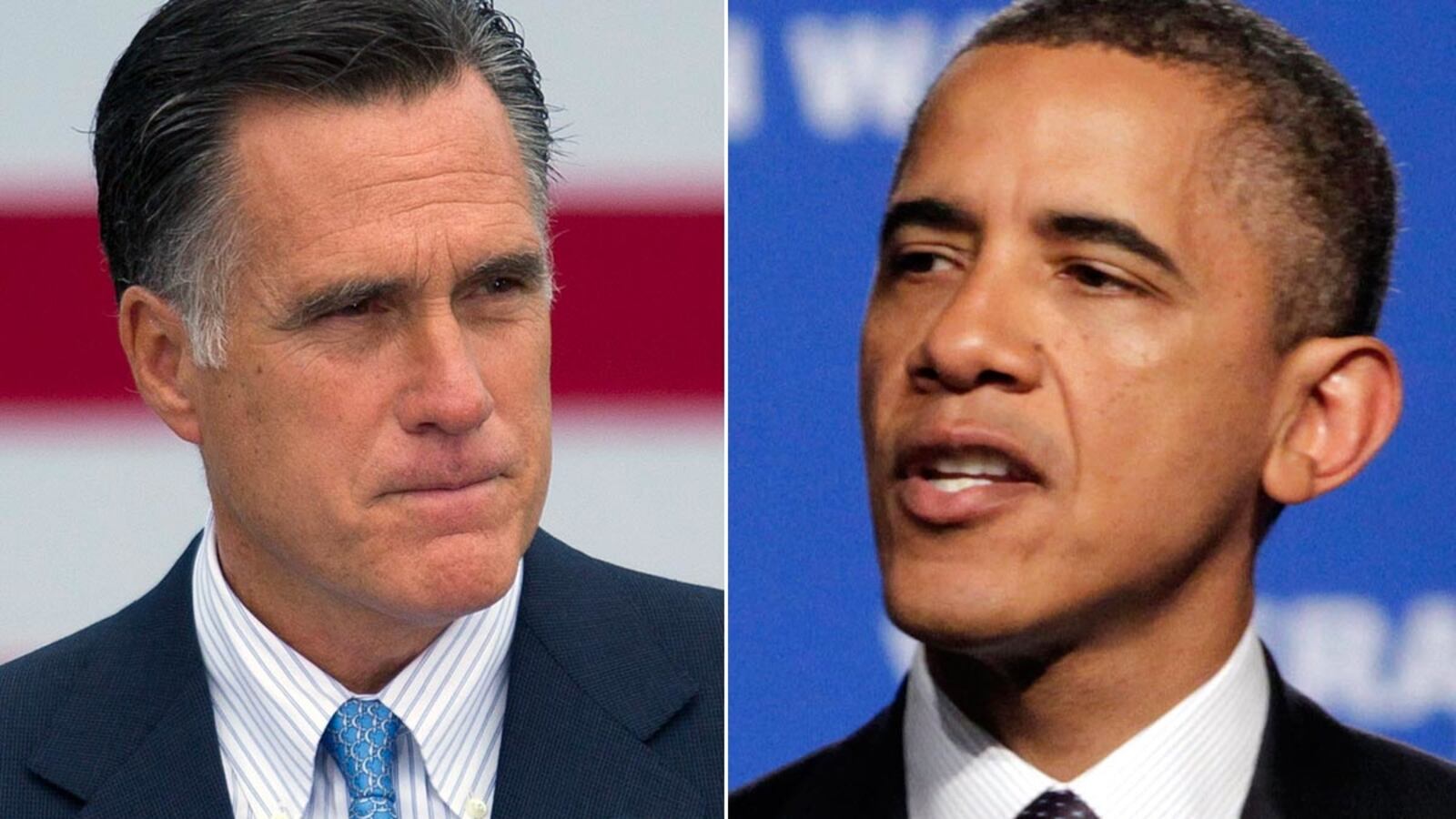Last weekend’s mass murder by a gunman in Colorado earned hardly a word on gun control from our elected leaders. Mayor Michael Bloomberg of New York cast scorn on Barack Obama and Mitt Romney with equal fervor, demanding, “[Why] don’t they stand up?”
On his visit to Aurora, Barack Obama spoke a few half-hearted words—he might have wished he could venture more—on the topic. His rival, Mitt Romney, continued simply to pander to the rich coffers of the National Rifle Association. In Washington, you can be assured that hardly anyone will do more, and not simply because members of Congress “don’t have the spine to act,” the verdict of Rep. Carolyn McCarthy, whose husband was murdered and son was wounded in a gun attack on a commuter train 17 years ago. The stark reality is that the half-century battle for gun control has been lost politically—again, and again, now perhaps permanently. And that outcome seems impervious to any new outrage perpetrated in the increasingly grim randomness of America as a recurring, movable shooting gallery.
Gotham City may have come to a movie theater in Aurora, Colo. But we have seen this film before—from Dallas in 1963, through the assassinations of Robert Kennedy and Martin Luther King Jr., the shooting of Ronald Reagan, and the slaughter of innocents at Columbine, Virginia Tech, Fort Hood, and Tucson—where Gabby Giffords’s “Congress on Your Corner” became a madman’s killing field.

The gunfire of earlier times evoked not just a sense of incalculable loss, an outpouring of tears and sympathy, but a resolve to rein in the reckless free market in weapons ranging from Saturday-night specials to assault rifles. The National Rifle Association was always there bristling on the barricades of opposition. It took five years after the loss of John F. Kennedy to finally outlaw the mail-order sale of rifles and shotguns, which was how Lee Harvey Oswald had obtained a $19.95 rifle and telescopic sight that changed the course of history. For the next two decades, there was token tightening of gun laws—and in 1986, the significant loosening called “The Firearms Owners Protection Act,” which softened restrictions on gun dealers and gun sales.
Then came an apparent breakthrough in 1994—and an intense and immediate backlash. I was on a phone call with President Clinton, House Speaker Tom Foley, and Majority Leader Dick Gephardt during which the president decided to push ahead with two bills: a ban on semiautomatic assault weapons, and the Brady Bill to require a five-day waiting period and a background check for handgun sales. Foley and Gephardt warned that the legislation could decimate Democrats in the midterm elections. They were right. Democrats lost the House; Foley, who enraged his rural constituents by voting for the Clinton package, lost his own seat. Since then, the only gun-control measure to pass Congress, in 1999, provided for trigger locks on new handguns. But by then the Brady Bill had expired—and so did the assault-weapons ban, in 2004.
Attempts to renew the legislation never got a serious look and certainly not an up or down vote. Vice President Al Gore attempted to shift the vocabulary and the debate by calling for “common-sense gun safety”—for example, to close the gun-show loophole that lets anyone, including convicted felons, purchase a rifle without any background check at one of these events. In the 2000 election, the NRA furiously denounced Al Gore as an enemy of the right to keep and bear arms. This probably cost him his home state of Tennessee—which would have secured the presidency for him, despite the theft of Florida.
Politicians read the returns—and they read the polls that have registered rising opposition to gun control. A 2011 Gallup survey reported that only 43 percent of Americans favored outlawing assault rifles, while 53 percent were opposed—a dramatic reversal in public opinion since the early and mid-1990s, when Democrats stood with the majority of the country, but lost seat after seat in Congress due to single-issue voting in NRA-influenced districts. Recent Gallup data also showed that 55 percent of respondents support making gun laws less strict—or keeping them as they are now.
You can debate the reasons for the change in public opinion; remember though, that those who favored modestly tougher restrictions paid a political price even when they apparently were on the safe side of the electorate. Advocates of gun control plainly aren’t there now. There would be no chance of limiting or monitoring purchases of ammunition on the Internet—which could have led authorities to the alleged Aurora gunman before he could lock and load any of the 6,000 rounds he bought online. Congress won’t even approve a prohibition against gun purchases by those on the terrorist watch list.
Following the Aurora massacre, Texas Rep. Louis Gohmert offered up the predictable and grotesque apologia of the gun lobby and its acolytes: “It does make me wonder ... with all those people in the theater, was there nobody in the theater that was carrying? That could have stopped this guy more quickly.” And how many more would have died during a gunfight at the cineplex? How would people in the audience have known that here was a bearer of friendly fire, not an accomplice in the massacre?
Mitt Romney surely doesn’t believe Gohmert’s nonsense, but he won’t whisper an objection to it as he dutifully toes the NRA line. In his 1994 Senate race against Ted Kennedy, he pledged: “I don’t line up with the NRA.” As governor, he signed a permanent assault-weapons ban for Massachusetts; he supported a federal ban too—something he now adamantly rejects. Along the flip-flop trail, Romney’s become a lifetime member of the NRA and averred that he likes to hunt “small, small varmints.” We all know why Mitt caved here as elsewhere. He gained the GOP nomination while suffering the loss of his own identity. He’s now firmly in the grip of the gun-rights fundamentalists—and as president would never dare offend them and risk a primary challenge in 2016.
Unfortunately, Romney’s pretty close to where the public now is—and the Congress too—and even many Democrats. And many others who in their hearts may favor gun control now treat it as the issue that dares not speak its name. They’re not cynical, they’re practical. They believe, correctly, that they can’t bend the arc of public opinion—and if they try, they will jeopardize not only the winning of elections, but the prospects for winning other great purposes such as economic justice and equal rights.
This is more than a rationalization. It is an inescapable fact of politics today. Thus the essential silence of Barack Obama on gun control. Aboard Air Force One, on a journey to console the victims and their families in Colorado, Obama’s press secretary said the president’s focus was on enforcing “existing law.” And you can’t expect him to launch a futile demand for tougher gun laws that would never pass the House or Senate. Nor should he pursue a course of faux courage that would represent a heedless disregard for everything else at stake in 2012—and that would sacrifice his chances in swing states like Ohio and Pennsylvania, thereby shattering the hope for a progressive presidency empowering the forces of reaction to impose their will across the board.
The psychic satisfaction of being pure on gun control is not worth losing the election—and letting Romney further pack a Supreme Court that has already ruled five to four that the Constitution confers an individual right to own firearms despite state and local gun laws. If this happened, things would only get worse.
The politics here is almost certain to be the same in 2016, 2020, and beyond. Someday, I hope, it will change. But what almost unimaginable provocation would this take? From Dallas in 1963 to Aurora in 2012, we have been summoned to grief—and to a safer, saner society. We are not there; we have moved backward.
The question is settled for the foreseeable future. And we can see all too clearly the dark nights that will rise ahead. RIP, gun control—and the victims still to come whose lives might have been saved.




